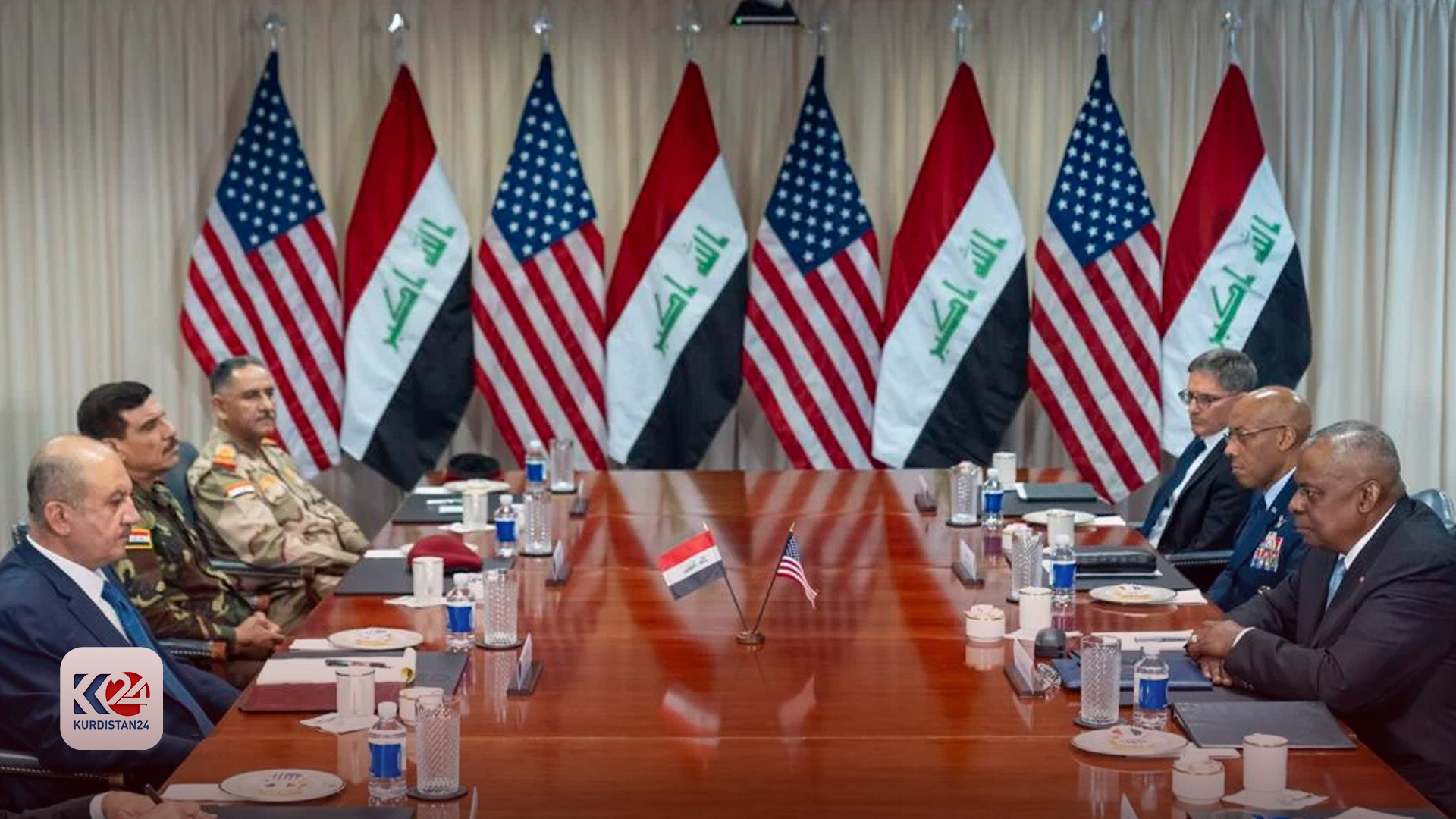US, Iraq Defense Secretaries Meet After Security Dialogue
“The threat from Daesh and its ideology has evolved over the past decade,” Austin said. “Yet, Daesh continues to plot attacks.”

WASHINGTON DC, United States (Kurdistan 24) – Following the conclusion of US-Iraq Joint Security Cooperation Dialogue (JSCOD), which was held in Washington for two days, on Monday and Tuesday, U.S. Secretary of Defense Lloyd Austin met with his Iraqi counterpart, Defense Minister Muhammad al-Abbasi.
This was the second round of the JSCOD—the first was held last summer, in August 2023. The focus in the just-completed set of meetings was “the transition” from the Global Coalition against ISIS, which was established in Sept. 2014, nearly a decade ago, “towards the U.S.-Iraq bilateral security relationship,” as Pentagon Press Secretary Maj. Gen. Pat Ryder (US Air Force) explained to journalists on Tuesday.
Read More: Peshmerga Represented in US-Iraq Military Talks
“I’m grateful for the courage of the Iraqi Security Forces,” Austin told Abbasi. “Fighting together with Coalition Forces, they achieved a territorial defeat of Daesh,” as DOD (Department of Defense) News reported.
Austin praised the U.S. and Iraqi governments for their work in “shaping the parameters to make the transition of Operation Inherent Resolve,” the formal name for the U.S. mission in the Global Coalition against ISIS, “into enduring security partnerships among Iraq, the United States, and other Coalition countries.”
“The threat from Daesh and its ideology has evolved over the past decade,” Austin continued. “Yet, Daesh continues to plot attacks.”
The attacks come “from the region and through {Daesh’s] global affiliates,” Austin explained. “So we must adapt the mission of Inherent Resolve to meet this changing threat.”
At the same time, “We remain deeply committed,” the U.S. Secretary of Defense added, to “Iraq’s sovereignty, security, and stability.”
Resurgent ISIS
The U.S. proclaimed the territorial defeat of ISIS in 2019, under former President Donald Trump. But to say that ISIS no longer controls territory is not the same as saying that it is not a threat, as Austin indicated.
Yet Trump repeated his claim even more dramatically last Thursday at the Republican National Convention, when he accepted his party’s invitation.
“We defeated 100 percent of ISIS in Syria and Iraq,” Trump stated, “something that was said to take ‘five years, sir, it’ll take five years, sir.’ We did it in a matter of a couple months.”
However, ISIS attacks continue and are even escalating, as Maj. Gen. Abdulkhaliq Talaat, the Kurdistan Region’s representative to the Joint Operations Command in Iraq, told Kurdistan 24 last week.
“While ISIS may not be as strong as it used to be, the presence of sleeping cells and security gaps in certain areas makes their threats more prominent," Talaat explained.
The Baghdad-based command, of which the U.S. is a key member, coordinates military operations among the regional commands throughout the country.
Read More: ISIS remains a persistent threat to Iraq's security, warns Kurdistan Region Major General
In Syria, the situation is as bad, or perhaps even worse. The senior envoy of the United Nations for Syria,
Geir Pedersen, told the Security Council on Monday that terrorism was “resurging” with attacks by ISIS expected to double this year.
Read More: UN envoy warns that threat of terrorism is `resurging' with attacks by Islamic State extremists
Indeed, last week, CENTCOM issued data on its activities for the first half of 2024. From January through June, as CENTCOM said, “ISIS has claimed 153 attacks in Iraq and Syria.”
“At this rate,” CENTCOM’s statement continued, “ISIS is on pace to more than double the total number of attacks they claimed in 2023.”
“The increase in attacks indicates ISIS is attempting to reconstitute following several years of decreased capability,” CENTCOM concluded.